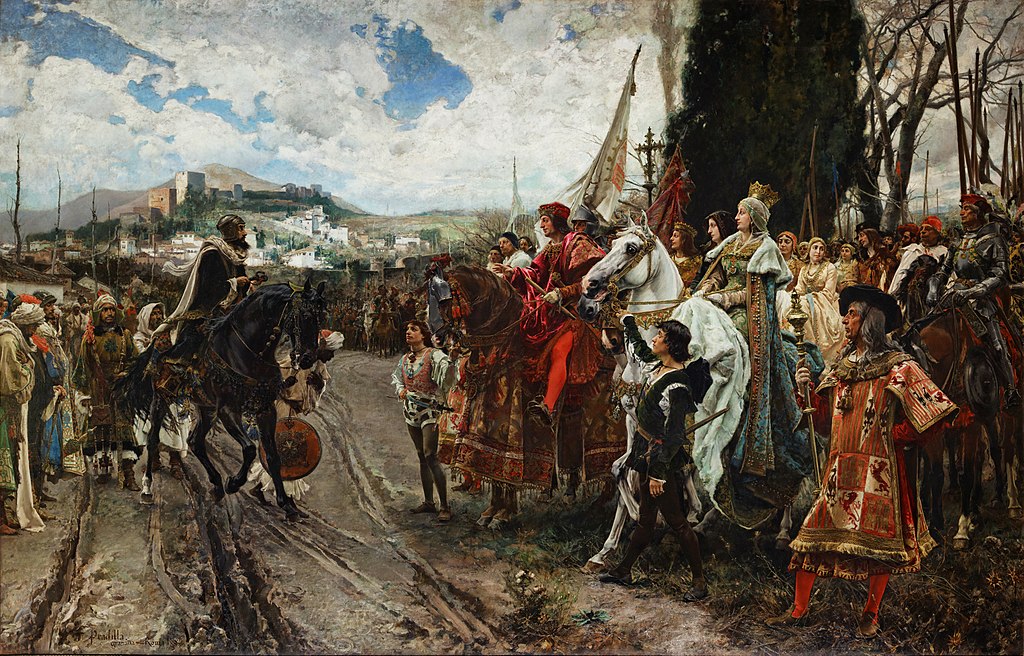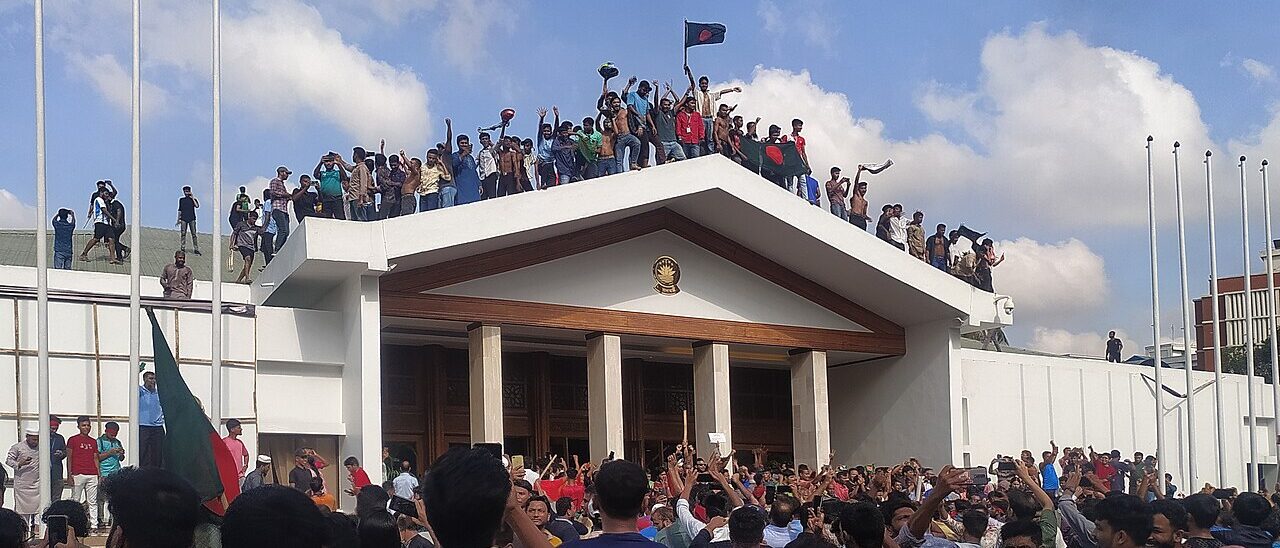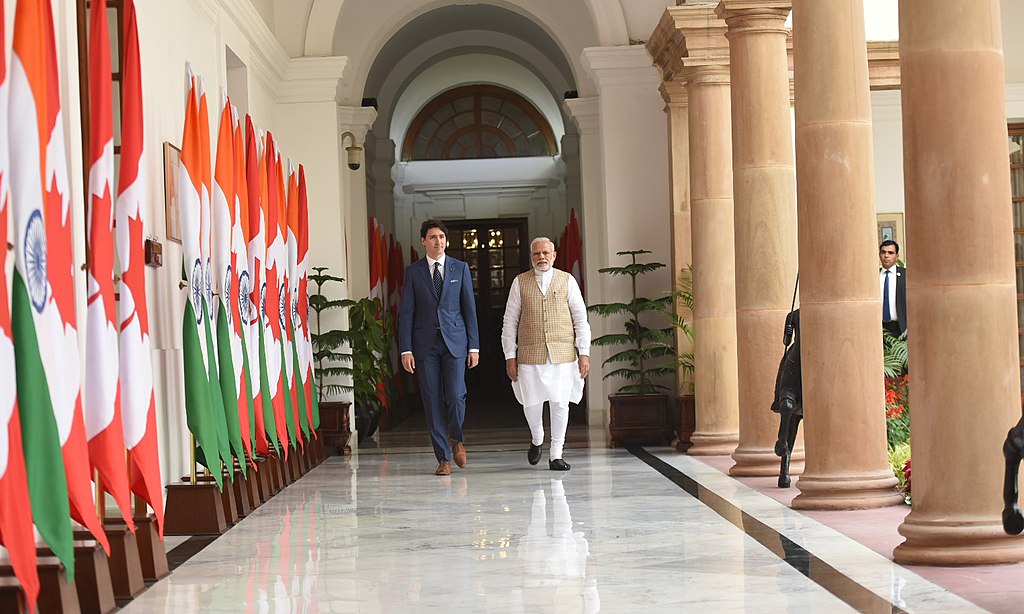By Ayesha Aijaz
My friends, say farewell to her as a noble place, or else entrust her to whomever her affairs [will] belong to [i.e. God]
We have neglected the rights of the Lord so he has allowed us to perish, all but a few of the bonds of Islam have been broken.
Our Muslim community has never distinguished what is right to do from what is forbidden; see how this disapproval is now [turned on us].
We have obtained what [God] has given us through what we have deserved; such is the evil life for those who lead it.
In our miser, splitting up [disunity] accompanies our unity; we have been brought to circumstances that are blameworthy.
A lamenting poem by an Andalusian poet from Ronda, Abu al-Baqa’ al-Rundi.
2 January 1492 marks the end of Muslim rule in Spain, which lasted for nearly eight centuries. It brought the Reconquista to close, consolidating Christian rule, although it took two and a half centuries for Granada to fall to Christian kings. It also marks the beginning of a dark chapter of religious intolerance to achieve the purity of land on the criterion of purity of blood, thus cleansing the Christian land of the impure infidels and heretics (Jews and Muslims) by their ultimate expulsion.
Fall of Granada was not by a sudden stroke of fate but was the last curtain of a long standing drama of disunity of Muslims, warfare between competing emirs, conspiracies within each dynasty, son rebelling against the father, civil wars, a financially decaying society as well as external aggression. Militarily weak, but protected geographically by Sierra Nevada, Granada was always at risk of being attacked and conquered by the stronger Christian armies. King Ferdinand’s full support to the last Muslim emir, Mohammad bin Ali’s (Boabdil or el Rey Chico i.e. ‘the little one’ in Spanish) rebellion against his father in 1483, that resulted in a civil war, weakened Granada even further.
With Christian armies slowly pressing inside the Granadan land, only the city of Granada was left for Boabdil to rule when he took power in 1490. When King Ferdinand asked Boabdil to hand over the city to him, out of surprise and despair, Boabdil sought help from North Africa to assist him militarily, but none arrived. The war and drought stricken city could not resist any further in front of the mighty Christian kings and Boabdil officially handed over the city to Isabella and Ferdinand on January 2, 1492 thus closing the chapter of the Muslim rule in Spain.
Before the handover, Boabdil was in negotiations with the Catholic monarchs who offered him that he should abandon Granada and retire in the Alpujarras in exchange of income for him and his descendants. His mother, who was a converted Muslim, always resisted the idea, as she wanted him to ‘die a king’[2]. But a text from Cronica de los Reyes Católicos by Alonsa de Santa Cruz (1550), explains how, later, she herself tried to convince Boabdil to stay away from war and reach some kind of agreement with the monarchs to avoid massacre of his family and the misery of people and towns under his rule at the hands of the Christian armies, if he goes to fight and gets killed.[3]
The city was stricken with hunger and Boabdil had lost many of his men and towns to the preceding military combats[4]. The people had no energy to fight in a state of hunger and desperation and they demanded peaceful negotiation with the monarchs. Some old Moors with military experience advised him to save his neck and pride by entering into a peaceful solution ‘for in this way their Majesties would respect their dignity, and treat him as a friend; if this were not done, they would surely all end up dead or imprisoned’[5]
Unfolding events of history reveal unmistakably that it was a wishful thinking, and events in Granada, although kicked off with a hopeful start in the shape of a magnanimous treaty written in 1491, ended up in forced expulsion of the Moors in only a hundred years, with all promises broken only under eight years. The terms of capitulation[6] were very comprehensive addressing the tiniest of the concerns of Moors. Put to practice, it would have set a glorious example of accommodating a minority in an unprecedented way.
Not only did it guarantee freedom to practice religion and protection of all the Moors, but also promised punishment to the Christians who try to make life of Moors difficult in any way. The properties of Moors would not be confiscated nor would their lives or estates be harmed ‘without due legal process or without cause[7]’. Mosques, minarets and Muezzins were to stay, and actually be respected. ‘The Moors shall be judged according to the code of Sharia, under their judges and qadis’[8]. There were promises of protection of customs, traditions, prayers and rituals. Muslims were given a choice of relocation to North Africa for free, for coming three years, and at a small price thereafter. ‘No Moor will be forced to become Christian against his or her will’. The promises were big and no one would have wanted to leave their homes and their beloved land of memories of their forefathers if they were offered such bountiful assurances. These clauses meant that effectively nothing would change for Moors, and there would only be better days to come.
All the Jews of Spain were expelled in 1492 because their conversion to Christianity did not materialize as they ‘apostatized” to Judaism again. The Spanish Inquisition took to task, the ‘heretic’ Jews who secretly practised their faith, and also the Christians converting to Judaism. The Charter of Expulsion of the Jews (1492) cut off all interaction between Jews and Christians to prevent the ‘corruption of the Holy Catholic faith and its followers’ from ‘the evil and wicked purpose that Jews continue wherever they live and congregate.’[9] The intimidating language warned the Jews never to return to the kingdom.
The terms of agreement for Moors were strikingly different. Full of leniencies and freedom to practice faith and retain property, language, dress and custom; it was a remarkable contract. But what did this mean? Were Moors relatively acceptable to the Holy Catholic faith as compared to the Jews, or were the clauses of treaty only a political move with an ultimate goal of pulling the Moors to the Inquisition with ‘a due legal procedure’ and with ‘a cause’, or was the conversion of Moors and their faithfulness to Christianity, not tried and tested until then?
The truth is that Moors were no better than the Jews in the eyes of Christian kings. Sancho IV (1295–1312) of Castile, in his book of advice that he compiled for his son wrote, ‘The Moor is nothing but a dog… Those things which Christian considers evil and sinful, he considers goodly and beneficial for salvation; and what we think beneficial for salvation, he considers sinful.’[10] According to sixteenth century Granadan historian Luis de Mármol Carajaval, in the early period after the fall of Granada, Spanish bishops urged Ferdinand to give the same choice to Moors as given to Jews i.e. conversion or exile, but the king rejected these demands as it would mean a return to war. According to Mármol, the king opted the policy of relaxation so that ‘through domestic communications with Christians, debating and discussing religious matters, [the Muslims] would understand the error they were in and abandoning it, …come to a true knowledge of the faith and embrace it, as many other barbarous nations had done in the past.’[11]
This article is continued in Fall of Granada and the Plight of Morisco (Part 2)
The views expressed herein may not necessarily reflect the views of JI FAD and/or any of its affiliates






